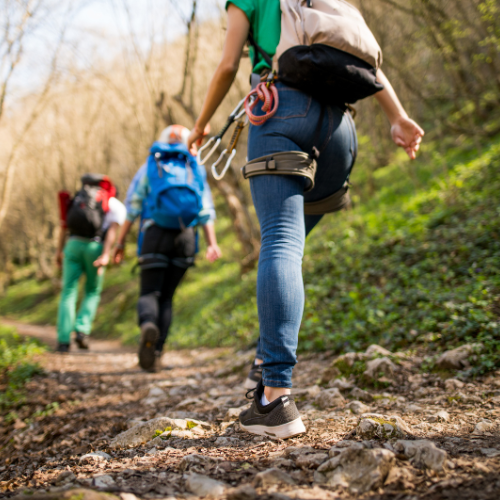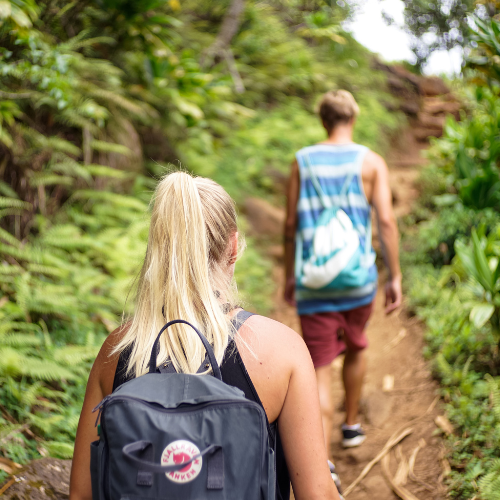Key Things To Pack For A Hiking Holiday
#Collaborative post
A hiking holiday is a fantastic way to immerse yourself in nature, enjoy the great outdoors, and stay active.
Whether you’re planning a weekend getaway or a longer trek, packing the right gear is essential for both comfort and safety. What you take with you on your hiking adventure can make all the difference in how enjoyable and smooth your trip turns out to be. Beyond the basics like clothing and food, certain items are often overlooked but are just as important.
First and foremost, the right footwear is critical. A good pair of hiking boots or shoes is essential for providing the support and grip you need on uneven terrain.
However, if you suffer from foot problems like overpronation, it’s worth investing in quality overpronation insoles. These insoles help correct your foot alignment, reduce strain on your ankles and knees, and prevent discomfort on long hikes. With well-supported feet, you’ll be able to tackle more challenging trails without the worry of pain slowing you down.
Hydration is equally crucial. Make sure you bring enough water to last the duration of your hike, as staying hydrated helps maintain your energy levels and prevents fatigue.
A good rule of thumb is to bring at least two litres of water per person for a day hike, and more if you’re tackling a difficult or long trail. Carrying a reusable water bottle or hydration pack will keep you hydrated without needing to stop frequently.
It is worth researching where you can top up on your hike with many camps offering fresh water.

Next, protection from the elements should be high on your list. Weather conditions can change quickly, especially in the mountains, so pack accordingly.
Lightweight, moisture-wicking layers are perfect for staying dry and warm, while a waterproof jacket is essential for sudden rain. A wide-brimmed hat and sunscreen will protect you from the sun, and a pair of sunglasses with UV protection will keep your eyes safe from glare.
Comfortable and functional clothing is another must-have. Opt for clothing that can easily be layered, so you can adjust to changing temperatures throughout the day. Breathable fabrics are key for avoiding sweat build-up, and make sure to bring a spare pair of socks.
Hiking with wet or damp feet can lead to blisters, and if you have overpronation, this discomfort can be amplified. Overpronation insoles can further help by providing added comfort and support during long hikes, reducing the risk of foot fatigue or injury.
A first aid kit should never be overlooked. Accidents can happen, and it’s important to be prepared for anything from blisters to minor cuts or scrapes. Stock your kit with bandages, antiseptic wipes, pain relief, and any personal medication you may need. If you’re going on a longer hike, adding items like a blister pad or an anti-chafing balm could come in handy.

Don’t forget to bring snacks that provide energy and sustenance during your hike. Opt for lightweight, non-perishable foods like nuts, dried fruit, energy bars, and jerky. These will help keep your energy levels stable and are easy to carry in your backpack. You’ll be able to stay fueled without having to stop for a full meal, which is especially useful if you’re hiking in a remote area with limited food options.
Navigation tools are essential for staying on track during your hike. Even if you’re following a well-marked trail, having a map and compass or a GPS device is important, especially if your phone loses signal. It’s easy to lose your way in unfamiliar territory, so having a reliable form of navigation will ensure you stay safe and on course.
Finally, consider bringing trekking poles if you’re hiking on steep or rocky terrain. They help with stability and take some of the pressure off your joints, particularly your knees. This is especially useful for those who have joint issues or are hiking long distances, as it reduces overall fatigue.
In summary, packing for a hiking holiday goes beyond simply grabbing a backpack and boots. Thoughtful preparation ensures you stay comfortable, safe, and ready for any surprises the trail might throw your way.
Whether you’re investing in good overpronation insoles for better foot support or making sure to stay hydrated and nourished, the key is to be well-prepared for an enjoyable hiking experience.